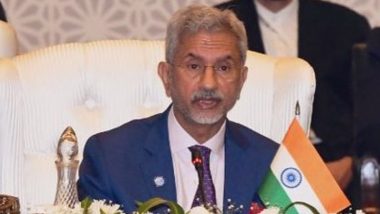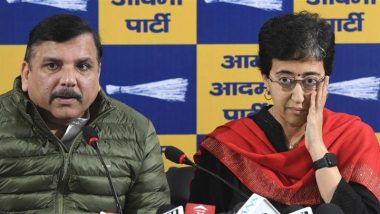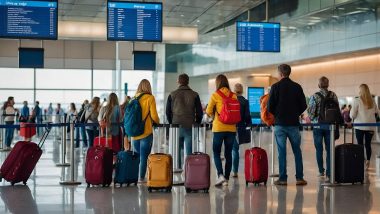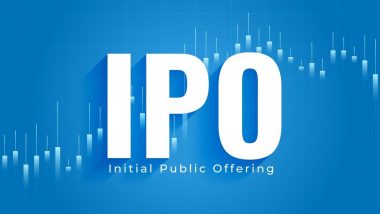New Delhi, November 12: India is confident of achieving USD 100 billion in annual bilateral trade with Russia well ahead of the timeline of 2030 and a more substantive relationship between the two nations has a larger global resonance, External Affairs Minister S Jaishankar said on Tuesday. There have been challenges to trade, especially with regard to payments and logistics and perceptible progress has been made in that regard, but there is still some work to be done, he said.
The external affairs minister was speaking at the 25th India-Russia Intergovernmental Commission on Trade, Economic, Scientific, Technological and Cultural Cooperation (IRIGC-TEC). The Russian delegation at the meeting was led by First Deputy Prime Minister Denis Manturov. In the meeting, both sides agreed to work towards developing a broad-based enabling framework for increasing economic engagement, according to the Ministry of External Affairs (MEA). Russian Deputy PM Denis Manturov Calls on PM Narendra Modi Ahead of Key Intergovernmental Meeting (See Pics)
The agenda of the IRIGC-TEC included cooperation in trade, investments, hydrocarbons, nuclear energy, connectivity, agriculture, science and technology, pharmaceuticals, healthcare, fertilizers and education. In his televised opening remarks at the 25th session of the IRIGC-TEC, Jaishankar said the trade between the two countries needs to be "more balanced and that would require addressing current constraints and undertaking greater facilitative efforts."
"As two major nations in an increasingly multipolar world, a more substantive relationship between us has a larger resonance," he said. The external affairs minister said New Delhi welcomes and fully reciprocates Moscow's growing interest in exploring economic opportunities in India. "Our economies are not only complementary in many respects but benefit from the trust and confidence built over many years. The growth in bilateral trade is now estimated at USD 66 billion and it is impressive," he said. India-Russia Ties: Our Economies Benefit From Trust, Confidence Built Over Years, Says EAM S Jaishankar.
"Our goal is that it needs to be more balanced and that would require addressing current constraints and undertaking greater facilitative efforts. Making it easier to do trade should be accompanied by progress in the negotiations on the India-Eurasian Economic Union FTA," he said. Jaishankar said India has noted Russia's growing interest in the Make in India programme and it would encourage joint ventures and other forms of collaboration between the two sides.
"I am confident that we will achieve the trade target of US dollars 100 billion by 2030, well before that," he said. The external affairs minister also highlighted India's impressive growth rate in the last few decades. "India that has many decades of 8 per cent growth at least ahead of it obviously values a reliable partner when it comes to resources, technology and best practices," he said.
Jaishankar also touched upon Russia's supply of fertilizers, crude oil and coal to India. "Russia has emerged as a major source of fertilizers for us. Its supply of crude oil, coal and uranium is indeed important. Similarly, India's pharmaceutical industry has emerged as an affordable and reliable source for Russia. "Looking ahead we are also exploring the mobility of talent, skills, customising them for the Russian market has to be a shared enterprise," he said.
The external affairs minister also talked about the importance of various connectivity projects. "Our joint endeavours in regard to connectivity, such as the International North-South Transport Corridor, the Chennai-Vladivostok Corridor and the Northern Sea Route must go forward," he said. "We will also be discussing cooperation critical for our food, energy and health security," he added.
In his remarks, Manturov also delved into fast evolving trade ties between India and Russia. "Over the last five years, the trade turnover of our country has grown more than fivefold. And India is now the second country among all the foreign economic partners of Russia," he said. "Among other things, we confirm our strong commitment on signing the free trade agreement between the EEU (Eurasian Economic Union) and India, as well as the bilateral agreement on services and investments. This fully meets the needs of our business community," he said.
Hours later, in a post on 'X', Jaishankar described the meeting as "productive".
"Co-chaired a productive and wide ranging 25th meeting of the India-Russia Intergovernmental Commission in Delhi. Thank my co-chair First DPM Denis Manturov and our delegations for their contribution," he said. "Our deliberations covered the complimentary and beneficial India-Russia economic and trade cooperation, reinforcing critical food, energy & health security and facilitating mobility of talent and skills," he said.
"Confident that our deliberations today will make a strong contribution to the direction and progress of our strategic partnership," Jaishankar added. In a statement, the MEA said Manturov and Jaishankar directed the working groups and sub-groups to work expeditiously for early finalisation of the programme of economic cooperation 2030. They also issued directions for taking steps to enhance market access that could enable business communities of the two countries to achieve the bilateral trade target of USD 100 billion by 2030. "Both sides also agreed to work towards developing a broad-based enabling framework for increasing economic engagement between the two countries," the MEA said.
The Russian first deputy prime minister called on Prime Minister Narendra Modi on Monday. He also held separate meetings with Finance Minister Nirmala Sitharaman and National Security Adviser Ajit Doval. "The rich exchange of views on matters of mutual interest during the visit of First Deputy Prime Minister Manturov to India will contribute towards developing better understanding between the countries and help expedite implementation of bilateral priorities, as well as further strengthen the special and privileged strategic partnership between India and Russia," the MEA said.




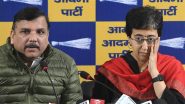



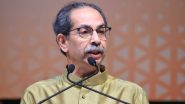




 Quickly
Quickly








